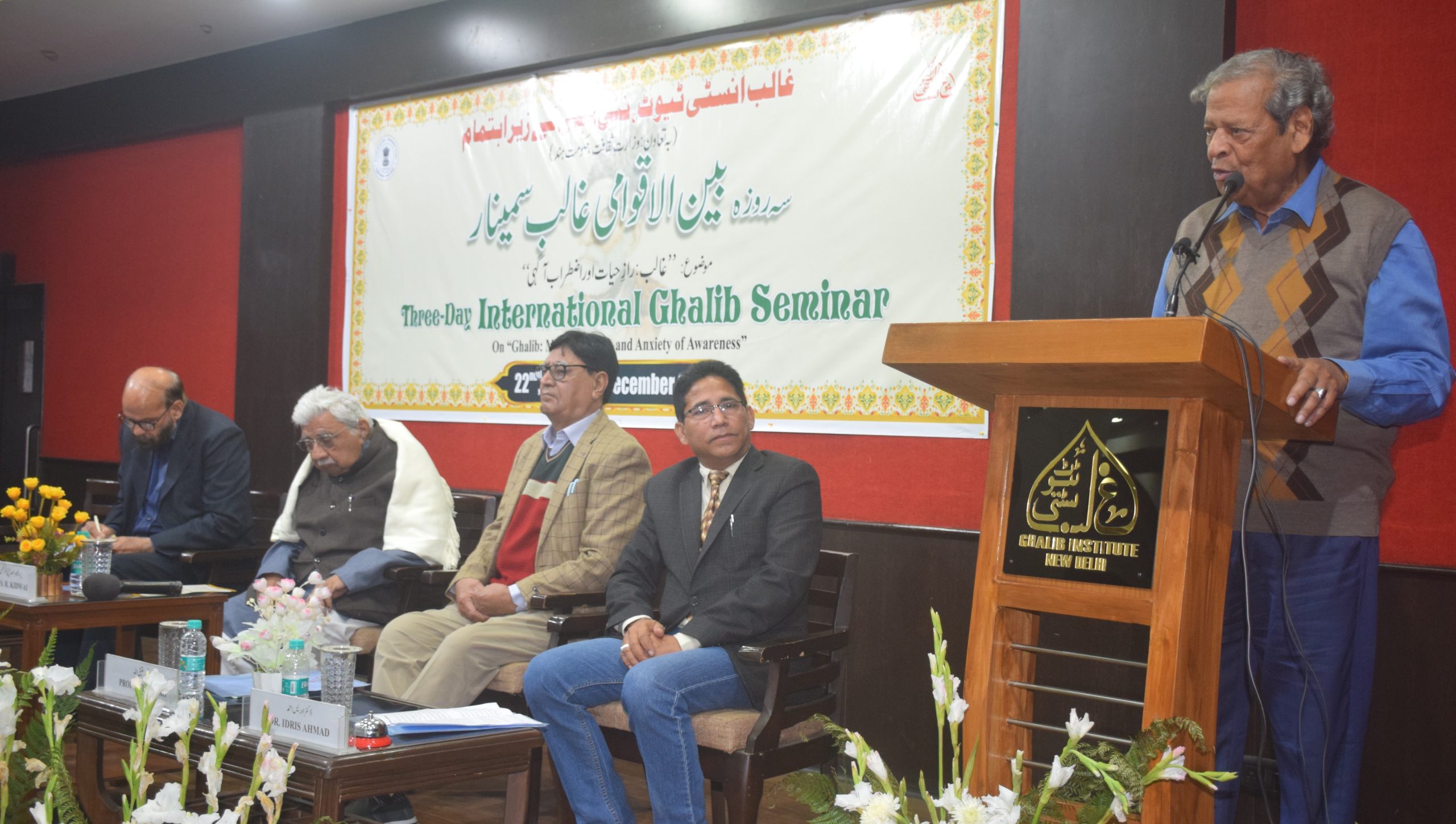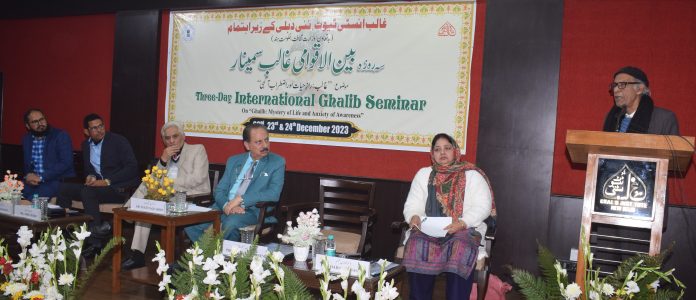– Shakilur Rahman
New Delhi, Dec. 25: The Ghalib Institute’s three-day international Ghalib seminar on Ghalib: Raaz-e Hiyat aur Iztiraab-e-Aagahi (Ghalib: Mystery of Life and Anxiety of Awareness) concluded here Sunday. Scholars from home and abroad presented papers in the seminar.
Presiding over a session of the seminar, prominent scholar of Persian Prof. Chandrasekhar expressed his concern that some phrases related to Ghalib have become so familiar that we never think about them afresh. For example, the Mughals gave two gifts to India in the form of Taj Mahal and Urdu. In fact, Urdu existed before the Mughals.
“It’s not necessary that everything said by teachers is correct. The statements must go through a process of analysis,” he observed.
Four eminent personalities presented their papers: Dr. Naresh on 1857, Kyuon Chup Rahi Zubaan-i-Ghalib (1857, Why Ghalib’s pen was Silent), Professor Muhammad Ghulam Rabbani (Bangladesh) on Ghalib ki Aman Pasandi Unke Maktoob ki Roshni Mein (Ghalib’s pacifism in the light of his writings), Professor Reza Ali Habibi (Iran) on Ghalib Shanasi Der Iran (Acquaintance of Ghalib in Iran) and Dr. Muhammad Akmal on Ghalib ki Maqbuliyat ki Wajah (Reason of Popularity of Ghalib).
Presiding over another session, Dr. Syed Taqi Abidi said Ghalib fills the treasure of meaning in poetry and creates a sense in it that other poets didn’t. He was very much convinced of the greatness of man.
In this session, Prof. Sharif Husain Qasemi presented his paper on Ghalib ki Ek Munfarid Farsi Ghazal (A Unique Persian Ghazal of Ghalib), Amir Mehdi on Ghalib: Raaz-e Hiyat aur Iztiraab-e-Aagahi (Ghalib: Mystery of Life and Anxiety of Awareness), Dr. Meraj Rana on Ghalib ki Daakhliyat: Adam se Wajood Tak (The Internality of Ghalib: From Non-existence to Existence) and Dr. Moidur Rahman presented a paper on Kalam-i-Ghalib mein Ghair ki Jalwahgiri (The Exposition of others in the Poetry of Ghalib).
Presiding over a session, Prof. Irtiza Karim said the mystery of life is the greatest apprehension of existence as every creation comes from the womb of apprehension. You will find a reflection of apprehension in every great creator. He further said, “The purpose of organizing the seminar is to understand the apprehensions of Ghalib.”
In this session Dr. Syed Taqi Abidi presented a paper on Ghalib ki Taraqqi Pasandi (progressivism of Ghalib), Prof. Aslam Jamshed Puri on Ghalib ka Tasawwar-i-Insan (Ghalib’s Concept of man), Prof. Abu Bakr Abad on Ghalib ka Tarz-i-Hiyat, Kashmakash-i-Hiyat aur Iztiraab-i-Aagahi (Ghalib: Way of Life, Conflict in Life and Anxiety of Awareness) and Dr. Altaf Anjum on Ghalib aur Nau Aabadiyati Adab (Ghalib and Neo-colonial literature).
Presiding over the next session, Professor Muhammad Kazim said the topic of today’s seminar is very interesting. The virtue of this topic is that we can see the works of other authors of Urdu through Ghalib’s concept of life and his apprehension.
In this session, Dr. Asif Ali Adil Ali Muhammad (Mauritius) presented a paper on Ghalib ka Tarz-i-Ihsas aur Mahsusat ki Bu Qalmuni (Expression of Ghalib’s Way of feeling and sensibility), Dr. Tashiana Ali Muhammad (Mauritius) on Mirza Ghalib ka Tarz-i-Fikr (Mirza Ghalib’s Way of Thinking) and Dr. Nasr Jabin on Mirza Ghalib aur Unnisveen Sadi ki Aurat (Mirza Ghalib and the women of the 19th century).
The seminar’s second day ended with Mushaira chaired by Dr. Syed Taqi Abidi with Amir Mehdi as Special Guest.
Chairing the third day’s first session, Prof. Anees Ashfaq said the virtue of great poets is that visions of the time are found in them. Zak Derida’s modern concept of language is already present here in Ghalib’s works. In this session, Prof. Khawaja Muhammad Ikramuddin presented a paper on Kalam-i-Ghalib ke Naqsha Haye Rangarang (Composite Color in Ghalib’s Writing), Dr. Rehan Hasan on Ghalib ki Nazar Mein Raz-i-Hayat-o-Mamat (Mystery of Life and Death in Ghalib’s Views) and Dr. Syed Saqib Faridi on Ghalib ki Ghazal Mein Zindagi ki Be-Sabati (Instability of Life in Ghalib’s Ghazal).

Presiding over another session, Professor Qazi Jamal Hussain, said that ‘unconsciousness’ in Ghalib’s writings is equivalent to awareness. No other poet has used the methods of awareness from upcoming situation. No thinker or scientist could discover the reality of existence, only the poet can clarify its reality to some extent.
In this session, Prof. Ateequllah presented a paper on Ghalib: Khater Agah aur Heet-i-Idrak (Ghalib’s Awareness and Area of Perception), Prof. Anees Ashfaq on Ghalib ka Tilism Khana-i-Azar (Ghalib’s Mysterious House of Sorrow) and Dr. Khalid Alvi on Ghalib ka Andaz-i-Fikr (The Way of Ghalib’s Thinking).
Presiding over the last session of the day, Professor Anwar Pasha said apprehension and awareness complement each other. Apprehension is born from the womb of awareness; otherwise ignorance is the cause of comfort.
In this session, Professor Qazi Jamal Hussain presented paper on Ghalib ka Tasawwar-i-Hiyat (Galib’s Concept of Life), Professor Farooq Bakhshi on Ghalib aur Taraqqi Pasand Tanqeed (Ghalib and progressive criticism) and Professor Syed Hassan Abbas on Ghalib ki Khud Sanasi (Self-introspection of Ghalib).
Presiding over the concluding session, Prof. Siddiq-ur-Rahman Kidwai, said, “Our effort is to bring out useful things in the light of dissertations and avoid repetition.”
Professor Syed Khalid Qadri said the topics of the seminar were very important; they should be seen in the light of modern theories and our young generation can do it in a better way.
Director of the Institute Dr. Idris Ahmed extended a vote of thanks.
At the end of the seminar, the sub-branch of Ghalib Institute, Hum Sab Drama Group presented the Urdu drama ‘Chauthi Ka Joda’ written by Ismat Chughtai in the form of a story, under the direction of Mr. Abbas Haider. Mr. Sarfaraz Ahmed converted it into drama.




